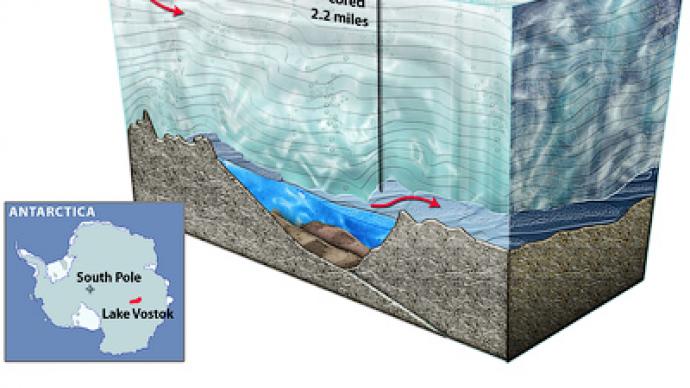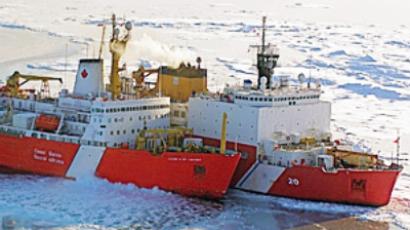Lake Vostok mystery: Alien life, global warming and Hitler's archive

Scientists, environmentalists and even World War II historians have reacted with a mixture of excitement and concern to news that Russian geologists have drilled through to a huge subglacial lake in Antarctica, some 20 million years old.
It has taken more than 30 years to work through 3,700 meters of thick ice – drilling in temperatures as low as minus 80 centigrade.But it will have been worth it, if even half the claims being made about the lake are true.
Life not on Earth
Sealed off below the ice for millions of years, the lake is a unique environment.“According to our research, the quantity of oxygen there exceeds that on other parts of our planet by 10 to 20 times. Any life forms that we find are likely to be unique on Earth,” says Sergey Bulat, the Chief Scientist of Russia’s Antarctic Expedition to Russian Reporter magazine.But there is one place not on Earth that has similar conditions – Europa, the mysterious satellite of Jupiter."The discovery of microorganisms in Lake Vostok may mean that, perhaps, the first meeting with extra-terrestrial life could happen on Europa," said Dr Vladimir Kotlyakov, Director of the Geography Institute at the Russian Academy of Sciences to Vzglyad newspaper.So far scientists disagree about the presence of life forms in the water.A lot depends on how the lake was formed. If the lake formed when Antarctica was already frozen – as ice was melted by the Earth’s core – then the chance of finding interesting micro-organisms are slim. But if the lake already existed when the Antarctic was still warm, anything is possible.Non-scientists have asked if these life-forms could be dangerous – undiscovered viruses, or perhaps even a monster, like that in the John Carpenter film The Thing.“Everything but the samples themselves will be carefully decontaminated using radiation. There is no need to worry,” Valeriy Lukin, Head of the Antarctic Expedition told Russian Reporter Magazine.
Western scepticism dismissed as sour grapes
But not everybody is pleased about the breakthrough.The Russian expedition originally used kerosene as anti-freeze, and in the last few years, has mixed it with the cleaner Freon. Rival Western expeditions have been using the hot-water drilling method – boiling the ice – which is slower but cleaner."National prestige thus becomes more important than the interest of the (scientific) community, which is to preserve this lake until non-polluting technology emerges,'' said Jean Jouzel, a scientist at France's Atomic Energy Commission (CEA), to the Herald Sun. "It's regrettable.”In an interview with the same newspaper, Professor Martin Siegert, who will lead a similar British expedition to another shallower lake in Antarctica, called reaching the deep lake “a major achievement”. Nonetheless, he warned the Russian scientists: "It's very difficult… to convince others that the experiment is going to be clean, when you have essentially two miles of kerosene to cross before you get to the lake surface."Lukin puts these environmental concerns down to Western envy as a result of losing the race to the bottom to the Russians.“In 2010 we gave our final environmental assessment to the Antarctic and Southern Ocean Coalition – a union of Western environmental NGOs – and to their greatest regret, they had to accept that the Russian expedition was not doing anything wrong,” he said. Lukin also pointed out that the Freon-based technology used since 2005 makes it impossible for chemicals to contaminate the lake, as they are pushed back to the surface by greater pressure inside the ice.
Looking for Hitler’s secret base
On a more far-fetched note, the breakthrough has given new hope to those searching for a secret base built by the Nazis in the ice cover of the same lake.Grand Admiral Karl Dontiz told Adolf Hitler in 1943 that “Germany's submarine fleet is proud that it created an unassailable fortress for the Fuhrer on the other end of the world.” It was even speculated that the remains of Hitler and his wife Eva Braun were transported to the base.Perhaps, the mission will now discover the base near the lake, though this appears somewhat unlikely.But even less spectacular discoveries will have to wait – the Antarctic summer is coming to an end, and the expedition will have to return to warmer climes. Russian scientists are proposing to use specially-designed swimming robots to collect the first samples from the lake water at the end of the year.
Igor Ogorodnev, RT













